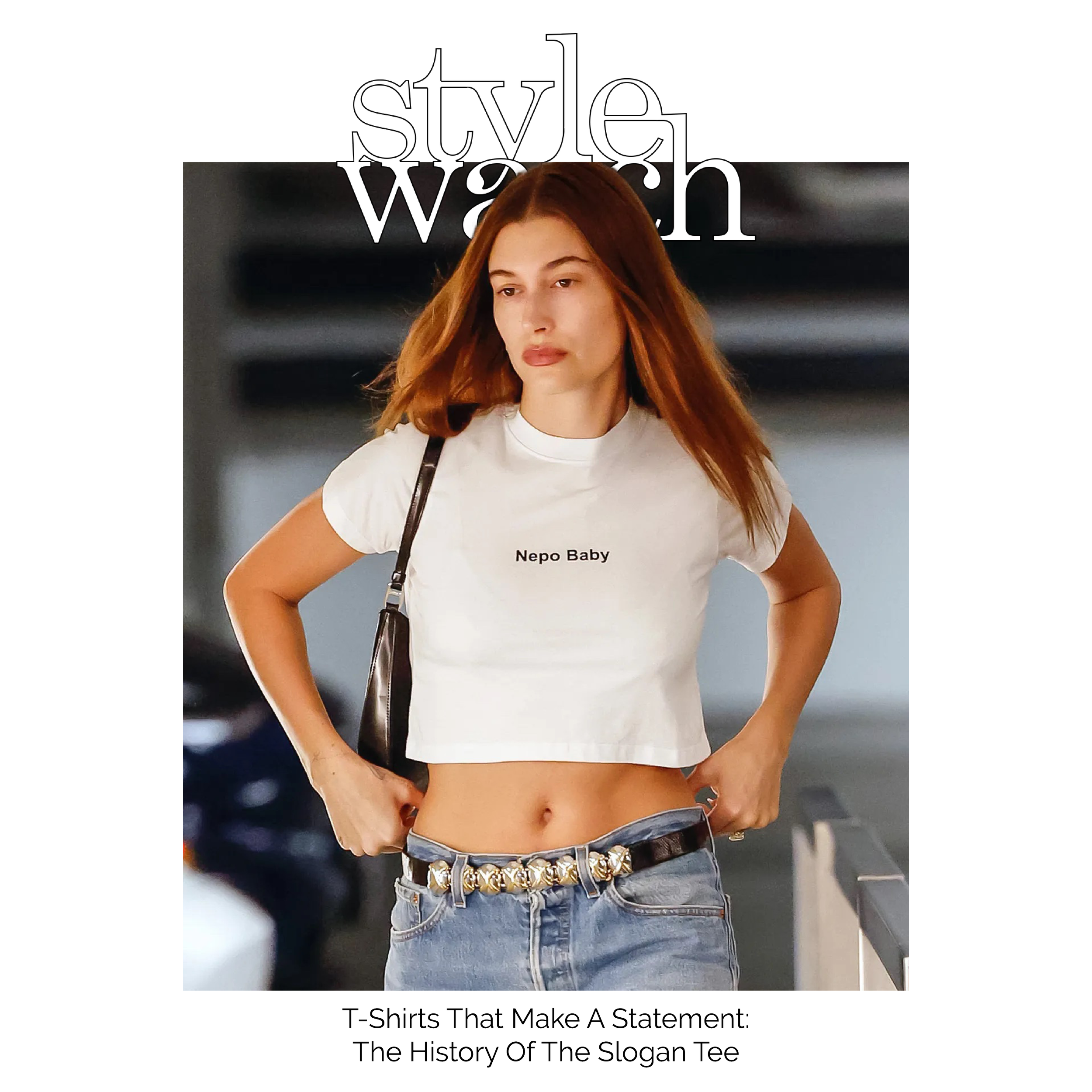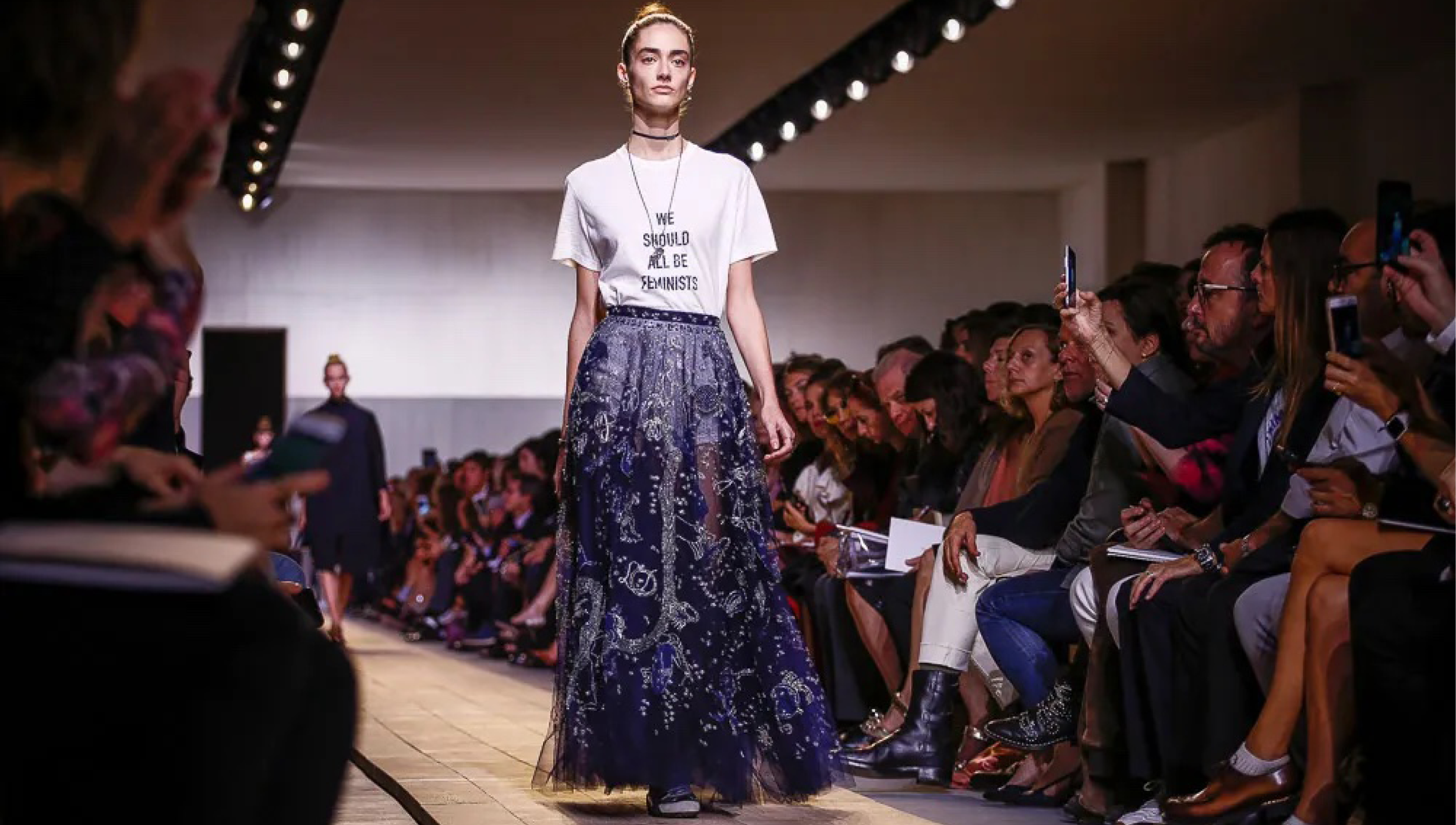T-Shirts That Make A Statement: The History Of The Slogan Tee
When referring to iconic Y2K fashion, slogan t-shirts are always part of the moodboard. From Britney Spears’s legendary “Dump Him” shirt that she wore for the paparazzi after she and Justin Timberlake broke-up, to Anne Hatheway’s “‘FedUp: We Need Freedom & Unity” tee at the 2004 Teen Choice awards, these shirts were part of a uniform for both female celebrities and their fans in the early 2000’s.
Britney Spears wearing the iconic 'Dump Him' t-shirt in 2002 via @popcultureheart on Instagram.
On the surface these punny t-shirts don’t seem to have anything in common, but for the women wearing them. They made a statement without having to give a verbal explanation. This concept of clothing with a message stems back to the 1960s with a brand called Mr. Freedom based in London. This brand was the brainchild of Tommy Roberts and Roger Lunn, who wanted to create wearable art that “was an eclectic and off the wall fusion of art, fashion, punk, and pop culture,” as My Vintage puts it. They made shirts with kitschy slogans on them like “Kiss Me” and “Handle With Care,” and had a massive following from celebrities like Jimi Hendrix, Elton John, The Rolling Stones, and The Who.
Mr. Freedom Slogan T-Shirts via My Vintage.
In the early 1980s, fashion designer Katherine Hamnett brought back the slogan t-shirt by using bold black print to make a statement. Probably her most well-known design was the “Choose Life” shirt, famously worn by Wham! in their music video for “Wake Me Up Before You Go-Go,” though the phrase had a much different meaning than it does nowadays.
Initially intended to be a message against war at the time, people used the slogan to raise awareness for various causes such as suicide prevention, anti-nuclear war campaigns, and other public health and liberal causes, most notably the AIDS epidemic. Advocates for the LGBTQ+ community, the members of Wham! wore these shirts as a form of protest against former British prime minister Margaret Thatcher’s anti-LGBTQ+ agenda amidst the public health crisis.
George Michael of Wham! wearing the “Choose Life” t-shirt.
The next era of slogan t-shirts came in the early 2000s and brought back the humor and irony of their 1960s predecessors. The main difference in style between these generations is how the shirts fit, as clothes in the early 2000s were notoriously tight-fitting. Baby tees became a fashion staple and the paparazzi ate it up, hence why Britney Spears wore the Dump Him shirt post-breakup, and other shirts with ironic one-liners like “I Am The American Dream” or ‘”I’m A Virgin (But This Is An Old T-Shirt).” When the world thought she was a vapid pop-star, she leaned into the persona and claimed her identity as a strong, powerful woman.
Britney Spears wearing the 'I Am The American Dream' t-shirt, via Pinterest.
Before the trend fully came back in the 2020s, Maria Grazia Chiuri made a statement in her debut collection as creative director of Christian Dior in 2016 by featuring a t-shirt that simply stated, “We Should All Be Feminists.” A quote by author Chimamanda Ngozi Adichie, it resonated with Chiuri as the first female creative director of Dior, and she felt that the best way to share her feminist beliefs loud and clear were to print it on a t-shirt paired with a beautiful skirt and sneakers on the runway.
Model wearing the 'We Should All Be Feminists' t-shirt on the Dior Spring 24 Ready to Wear runway via Vogue.
The Y2K style t-shirt has resurfaced in the 2020s as the trend cycle has made its way back around. Brands such as Praying and OGBFF came up with shirts that say, “God’s Favorite” and ‘”Flop Era,” which have the same quirky yet self-assured affect as the shirts worn by celebrities two decades prior. Many of today’s slogan t-shirts don’t necessarily have a deep meaning behind them; however, there have been a few examples of custom designs that tell a story about the person wearing them.
In early 2023, Hailey Bieber wore a simple white t-shirt with the phrase “Nepo Baby” across her chest, which had the internet in a frenzy. This phrase became common around that time and is often used to negate the talent of a celebrity who is born into a famous family. When asked by The Sunday Times why she made this fashion statement, Bieber replied, “that was me being, like, ‘I’m very aware of the situation [and] I’m going to wear it loud and proud because you are already labeling me as such and it’s true.’”
Hailey Bieber in the Nepo Baby t-shirt. Photo by Rachpoot/Bauer-Griffen via Vogue.
Another example of the slogan tee being used to combat internet trolls is a collaboration between artist Michaela Stark and Sports Banger, a brand known for creating humorous yet impactful text designs. Stark is a couturier who uses unique corsetry techniques to manipulate her body and show the beauty in traditionally less desirable body parts. When Victoria’s Secret had a resurgence in September of this year, they hired a slew of models not usually represented on their runway, including Stark. This sparked contaversy as many people wanted the runway to remain exclusive to thin models, and lead to comments like ‘Bring Back Gisele’ being left under Stark’s posts. That lead to the collaboration - a white t-shirt that resembles Katherine Hamnett’s work, simply stating ‘Bring Back Gisele’.
Michaela Stark posing in her creation for the Victoria Secret World Tour, via her Instagram.
Spark told Dazed, “trolling the trolls and throwing the words back in their face. Playing with how ridiculous and stupid they are.” “Being Back Gisele” is a sentiment of everything I am fighting against and is quite a dumb thing to say given the widespread negative impact we have seen from attitudes like this. “Repeating this phrase in a new context feels empowering.”
Michaela Stark wearing the 'Bring Back Gisele' t-shirt made in collaboration with Sports Banger via her Instagram.
Soon the Y2K renaissance will come to an end and slogan tees will lessen in popularity, though they will never fully go away as they are extremely versatile and convey a message more clearly than any other article of clothing. Whether they’re worn to make a statement or to add a bit of kitsch to an outfit, slogan t-shirts impact fashion both in the real world and on runways via language, humor and irony. What does your favorite t-shirt say about you?
Article by Danielle Tranter, Contributor, PhotoBook Magazine
Tearsheets by Chenglin Qu, Graphic Design Intern, PhotoBook Magazine












